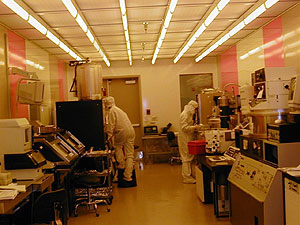|
Audio
Photos
Your Voice
|
Rushford goes nanotech
March 11, 2003
Nanotechnology uses components built at the molecular level to improve everyday products. They're already being used everywhere from the gas pump to the department store. The Bush Administration plans to invest close to a billion dollars next year to help develop the industry. So far here in Minnesota, the nanotech revolution is off to a slow start. But one small southeastern Minnesota town is betting big on nanotechnology.
Rushford, Minn. — Downtown Rushford is a collection of tiny streets lined with graceful old buildings. But when Kevin Klungtvedt surveys downtown he sees the future. He's creating the Rushford Institute for Nanotechnology. It will be a state-of-the-art lab and business incubator. "People are surprised when you mention it. Then when you explain it to them they say 'well, yeah, why not?' That makes a lot of sense. Pretty soon by the end of the conversation people are your supporter," says Klungtvedt.
 | |||
Klungtvedt has been pushing nanotechnology for two years.
"We just want to make this a nano friendly community. We're very serious about that," he says. "I spoke a women's group the other day and it was wonderful - one of the best receptions I've ever had. As the end they agreed to buy me some signs to put on sign posts on the outside of town saying nanotech friendly community."
The federal government predicts by 2015 one in four jobs will be nano related. It also predicts it will be a trillion dollar a year industry. The industry will need workers and that's where the Rushford Institute for Nanotechnology hopes to cash in.
 | |||
Once it's up and running, it will have room for about six small companies to create a range of nano-products. Things like faster computer chips, super fast-acting pills, and tools to clean up the environment.
Minnesota's primary nanotechnology lab stands on the U of M's Minneapolis campus. Here researchers clad in special biosuits peer into high powered microscopes. Stephen Campbell oversees the lab. He's a professor of electrical and computer engineering.
"This is our plasma-processing bay," he says on a tour of the lab. "A lot of our work processes actually run in plasma. Plasma is kind of a process where you ark electricity through a gap."
 | |||
It cost $50 million to set up this lab. The folks in Rushford hope to spend more like $4 million. In many other parts of the country state government has pitched in to cover such costs. The U of M's Stephen Campbell says its time for Minnesota to catch up.
"California, New York, Ohio, Illinois, Michigan: are all making inroads in this area because they see it as the next big growth area," he says. "Everyone wants to be the next Silicon Valley. It's not going to happen unless you make the investment today."
Rushford community leaders like Kevin Klungtvedt want lawmakers to do just that. They need more than a million dollars of state funding over the next two years to get the project up and running.
It's a tough time to be making that pitch. Governor Pawlenty has proposed cutting the funding to Minnesota Technology Incorporated, an economic development agency focused on outstate communities. Klungtvedt is undeterred though. He says it's an investment in the future.
"We're starting in Rushford but there's no reason we don't think other towns can go along with it. We'll grow this thing," says Klungtvedt.
The Rushford Nanotechnologists have the support of local lawmakers and some state funding is likely. They say they've already planted the seed. In order to graduate from Rushford's high school students have to meet a nanotech requirement. It's all in anticipation of high paying jobs Rushford hopes to gain thanks to nanotechnology.
|
News Headlines
|
Related Subjects
|

